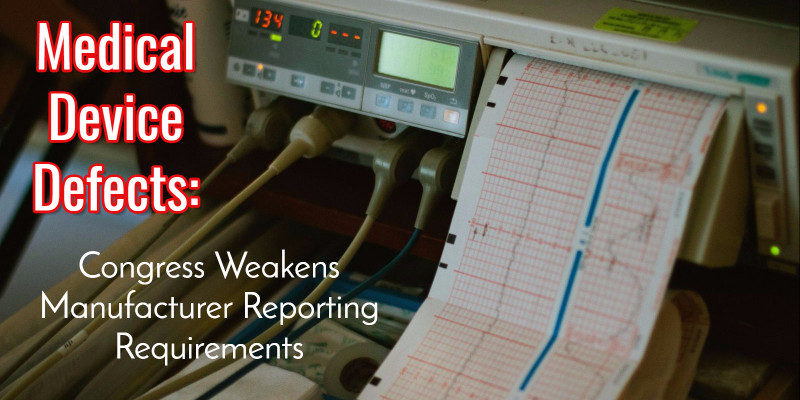
As Medical Device Defects Go Unreported, Congress Loosens the Law for Manufacturers
Is there such a thing as “too soon” when it comes to communicating information about potentially dangerous products? A proposed regulatory change covering medical device defects, which won preliminary Congressional approval last week, says that there is.
As part of a wider reauthorization of fees – part of a deal that expires later this year – manufacturers have been permitted to delay malfunction reporting to the Food and Drug Administration (FDA). The FDA Reauthorization Act of 2017 passed in the House of Representatives and now moves on to the Senate, where it is widely expected to pass into law.
Device makers will have three times as long to report malfunctions. That’s up from 30 days to three months, giving manufacturers plenty of time to work on their PR when something goes wrong.
Manufacturers would also be permitted to summarize product errors in even the most life-saving devices, providing fewer details about potential defects and limiting how much information the public receives. This comes in stark contrast to the tightening of laws in the European Union this year, where research unsurprisingly shows that improving reporting requirements can help to reduce adverse events for patients.
The change provides a big boost to the medical device sector, which is booming to the tune of $148 billion. Rapid roll out of new devices is an important part of this competitive field. This makes any reduction in the regulatory burden a welcome move. In many business sectors that makes sense, but the health of patients is not an area to cut corners, even if it does mean some extra paperwork.
Unfortunately, it appears that competition supersedes caution when it comes to medical device defects, despite the potential to negatively impact the nation’s health.
It is some small comfort to patients that device makers are still required to promptly report any product-related harm to patients, or deaths that occur as a result of using them.
Consumer groups are already decrying the extension to malfunction reporting. A spokesperson for the National Center for Health Research explained that the move is ill-advised, saying it “will exacerbate the tendency to underreport” potentially defective products. Other health care observers echo that sentiment, viewing the move as a gift to corporations in the industry, which could put public health at risk.
Underlining that fact, the F.D.A. has admitted that it believes medical device errors are significantly underreported. Now that manufacturers have longer to conceal such defects and aren’t required to provide as much detail as before, it’s hard to see any improvement to regulatory reporting on the horizon.



